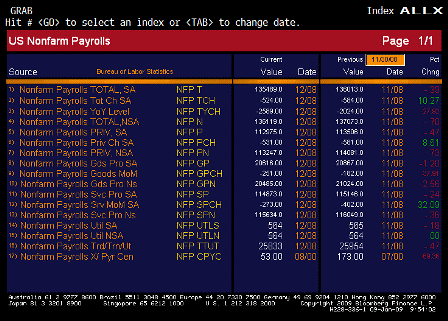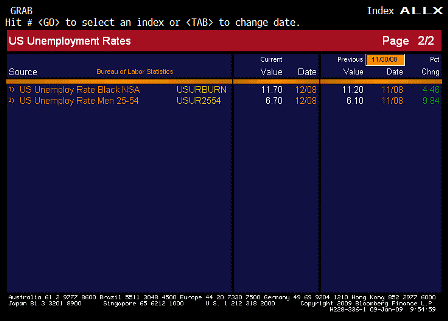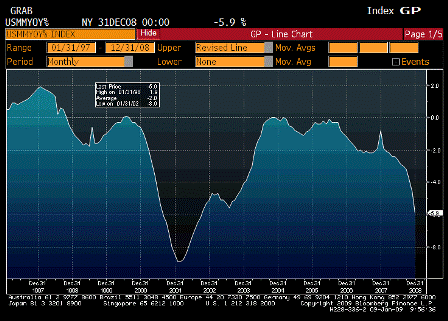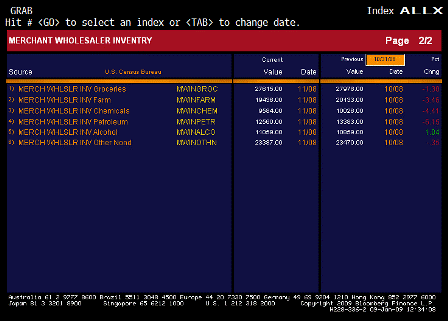Thanks, at least it got a mention.
The bang for the buck thing is pathetic. That has nothing to do with anything.
>
> On Sat, Jan 10, 2009 at 9:36 PM, Scott wrote:
>
> FYI, the below has only copied in those
> economists specifically naming a payroll tax
> holiday. Many of the comments here and in
> the proposals not included demonstrate an
> unfortunate lack of understanding of sovereign
> money. On the other hand, those copied
> below demonstrate that the payroll tax holiday
> is supported by at least some economists from
> just about every political and economic
> persuasion.
>
The Ideal Stimulus Package
by Catherine Rampell
Dec 16 (Economix) — President-elect Barack Obama and members of Congress are considering a fiscal stimulus package that’s reportedly in the ballpark of $500 billion. How should that money be spent?
We asked a group of economists how they would use the money if they had their druthers. For simplicity’s sake, we gave them the condition that they had to use every penny of the $500 billion on government spending or tax cuts or both. A collection of their responses is below.
Tyler Cowen, professor at George Mason University: “I would modernize the few critical bottleneck airports in the U.S., most of all La Guardia and Kennedy. That would not cost a fortune.
“I would try to ensure that state and local governments do not cut funding which they will later restore. To me that is more important, and more conducive to macroeconomic stability, than embarking on new and potentially dubious programs. That will cost most of the money. It’s not that I think state and local governments are always so efficient and wise, but rather this is a very simple and direct way to prevent the economy from being hit by yet another sectoral shock when it is already reeling.
“There are many good ideas, such as electronic medical records, that will not benefit the economy as macroeconomic stimulus. And so they do not make the list as you have phrased the question.
“If there is money left over I would spend it on cutting the Social Security payroll tax for specified groups of lower- to middle-income workers, thus encouraging the resumption of hiring.”
Mark Zandi, chief economist at Moody’s Economy.com:
“The package includes $300 billion in government spending and $200 billion in tax cuts. Government spending provides the largest economic bang for the buck, particularly infrastructure spending, as it immediately adds to output and jobs here in the U.S. Aid to state governments will also forestall immediate cuts in programs and jobs that states have to undertake to satisfy their balanced budget requirements. Infrastructure spending will take time to benefit the economy, and a tax cut is necessary to provide some quick support to the economy. A payroll tax holiday and a permanent payroll tax credit would be effective tax cuts, particularly if designed to help harder-pressed lower- and middle-income households and smaller businesses. If I had my druthers, however, the recovery package would be measurably larger than $500 billion. It is important for policy makers to send a strong and clear signal that they will do whatever is necessary to revive the economy. Only a concerted, comprehensive and consistent policy response stands between a severe recession and another depression.”
Edward L. Glaeser, professor at Harvard University:
- “(1)…I would certainly put money into scholarships, but you can’t spend 500 billion that way. I haven’t even tried to cost it out. I would  by the way  accompany these things with a certain amount of living assistance that would be conditional on good performance in the program (getting a degree if appropriate).
- “(2) There must be good transportation and infrastructure projects out there  I would do this probably with states proposing things that are then evaluated by an independent committee to look at cost/benefit analysis. Then make the money contingent on getting highly rated by this group. I presume broadband makes sense.
- “(3) Aid to states, as a form of revenue-sharing, is O.K. I would also tie this to good performance in other areas…
- “(4) Ramp up the Earned Income Tax Credit.
- “(5) Temporarily have the federal government pay the Social Security taxes of poorer Americans. The key is to get money in the hands of people who will spend it  both for that reason and conventional equity grounds  it makes sense to target money towards the poor. They aren’t paying regular taxes (mostly)  the only taxes that can be cut for this group are the S.S.D.I.-type payments  so let’s cut these. Obviously, it needs to be done in such a way that minimizes any distortions not to work.”
Laura Tyson, professor at the University of California, Berkeley, Haas School of Business and chair of the National Economic Council and President’s Council of Economic Advisers under Bill Clinton: “The U.S. economy is caught in three related crises that are reinforcing one another in a downward spiral: a crisis in the housing and mortgage market; a credit crisis; and a crisis of collapsing private demand. These three crises are not self-correcting. They are self-reinforcing. They can be mitigated and reversed only with bold government policies that include: a fiscal economic stimulus package of government spending and tax cuts to fill the gap caused by the shortfall in private demand; policies to stem the mortgage and foreclosure crisis; and policies to stem the credit crisis by recapitalizing the banks and acquiring assets not currently trading among private actors.
“There are three broad goals of fiscal stimulus measures: to reduce the depth and severity of the recession caused by the sharp fall in private demand; to help those most hurt by the recession; and to encourage economic activity that provides a basis for sustainable growth and prosperity in the future.
“Four principles should guide the choice of stimulus measures:
- “They should be timely in the sense that they increase demand as quickly as possible: examples include federal grants and loans to state and local governments and temporary tax relief.
- “They should have a significant impact on spending and employment: examples include extended jobless benefits and infrastructure spending on already approved projects.
- “They should provide relief for those who are most adversely affected by the recession: examples include extended jobless benefits and food stamps and support for state Medicaid programs.
- “They should focus on growth-enhancing investments in education, infrastructure and alternative/green energy development: examples include: increased support for work-study programs and Pell grants; infrastructure spending on mass transit programs; and enhanced tax credits for the production and utilization of alternative energy.
“The size of the stimulus package depends on how deep and long the recession turns out to be. A 4 percent reduction in G.D.P. indicates a stimulus package of about $600 billion spread out over two years, with the lion’s share spent in the first two quarters of 2009. Based on current economic forecasts, I think a stimulus package of at least this magnitude is warranted. Given the sharp drop in economic activity, I think the dangers of doing too little outweigh the dangers of doing too much.
“For a $500 billion stimulus package, I would include the following policies:
- $40 billion for additional UI and food stamp benefits
- $175 billion of infrastructure spending, including about $90 billion for alternative energy and green initiatives
- $120 billion for grants and loans to state and local governments
- $165 for household and business tax relief (including a temporary payroll tax holiday)
“I would also support additional government spending of $40-$50 billion for a foreclosure relief/loan modification program. According to scholars at the Center for American Progress, this amount could prevent more than 3 million foreclosures on $640 billion of mortgages and help ease overall credit market conditions. This amount of foreclosure relief could be financed out of the TARP program or included in a larger stimulus package.
“Finally, I would also support a bridge loan for the auto companies in the range of $15-$20 billion. This could also be financed out of the TARP program or included in a larger stimulus package.”
[top]





















